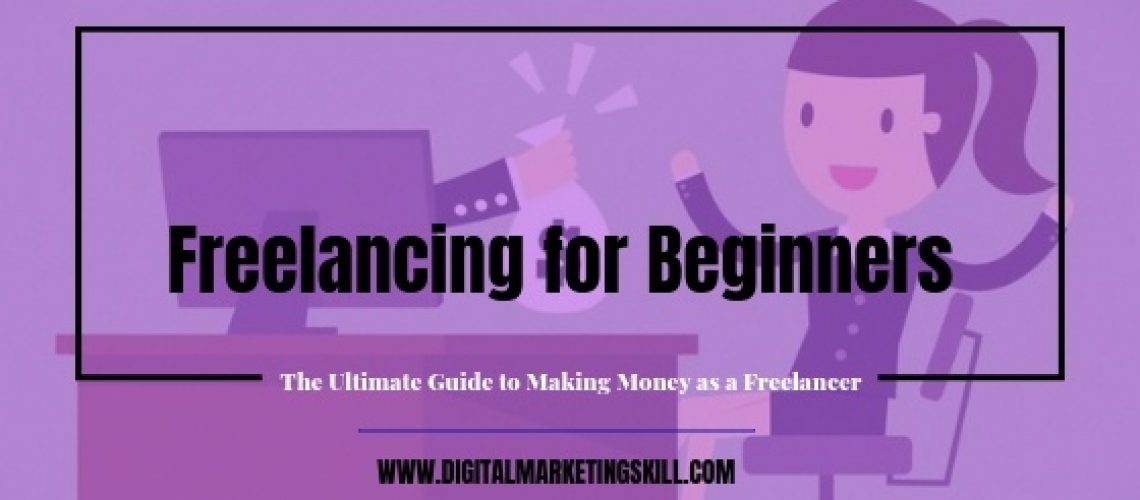Freelancing can be really scary for beginners.
Even when freelancers are the ultimate entrepreneurs. Businesses love freelancers because they bring an array of industry skills, a solid sense of self-motivation, and cost less than the traditional full-time employee.
Freelancers put the “free” in freedom, meaning, they’re able to walk away from less desirable jobs while honing in on the coolest clients and the best rates.
Freelancers make their own success in the world in an exciting new way that brings great risk and great rewards.
Freelancing is an attractive way of life. The independence, autonomy, flexibility, and unlimited financial potential are all incredibly inviting, especially for employees who are tired of their mundane work environment.
But, there’s still some mystery surrounding this career choice.
Folks ask:
As a freelancer, how do you make money? Where do you find work or jobs? How do you figure out what to do? What about insurance and benefits?
These questions are what typically stop people from pursuing a full-time freelance career.
And these questions are what we’ll answer in this guide.
This article will help you if you are:
- Considering working as a freelancer but haven’t taken the plunge into the gig economy.
- Looking at changing careers and making money from home
- A seasoned freelancer who’s wondering about getting high paying freelance gigs.
- Looking for some new tips for navigating the gig economy.
- Need more information? You can learn the practical steps for the most popular freelancing skills like email marketing, social media, SEO and content writing,etc., from our digital marketing training. Click here to learn more.
What is Freelancing?

Freelancing means doing contracted work for multiple clients and companies remotely.
A freelancer is a self-employed person who offers services to clients, and often to multiple clients at a time.
These services are usually offered to businesses, through the use of utility and task execution tools.
Get 50% Discount to Master ALL Aspects of Digital Marketing That Can Earn You $2,500 - $5,000 a month (Even if you are a complete beginner!)
Our students that intentionally implement what they learn from our digital marketing course make back the entire course fee within a single month or more after completing our course because our course gives them many income generating options with unlimited earning potential with no age or location barrier. The best part is no technical skills are required.
An opportunity to change your lifestyle and make money working from anywhere in the world. The results our students get from our digital marketing course prove this could be applied to any market or country and that it is designed for any skill level and work background.
*By signing up, you agree to our privacy policy and terms of service.
A freelancer’s field of expertise can range from content creation, and app development to tutoring, and he or she could also be referred to as an independent contractor or self-employed worker.
Nearly every type of service needed by most businesses could be provided by a freelancer, including marketing, publicity, advertising, technological support (such as web programming), creative works such as graphic design, and financial support such as bookkeeping.
First, you should ask, is freelancing for me?
Before moving forward, let’s take a breather and do a little self-analysis.
Is freelancing right for you? If so, what work would you do as a freelancer?
What would your niche be?
Here are a few questions to ask yourself to evaluate whether or not you’re ready for a freelance career.
Why do you want to freelance?
Are you looking for a more flexible schedule, or are you merely trying to escape your dreaded commute?
Do you want to expand your professional horizon, or are you simply bored at work? You might’ve heard it before, but the grass isn’t always greener on the other side.
Pursuing freelancing for the wrong reasons will make it hard to keep going when the going gets tough.
Can you afford to freelance?
A freelance career holds the promise of a higher salary and unlimited income potential. After all, as a freelancer, you’re the one deciding what you make and when you make it.
But you’ll likely not see that income right away.
The first few months (or years) of freelancing typically involve sacrificing income while setting up your business, establishing yourself, and building a huge client base.
Are you comfortable with being uncomfortable?
Freelancing can be majorly uncomfortable.
You won’t always know where your next paycheck is coming from, you’ll probably be rejected more times than you can count, and you’ll experience a few days where you ask yourself:
“Why the heck am I doing this?
All of these thoughts and feelings are normal, however, we consider them as growing pains.
After all, if it’s not challenging you, it’s not changing you.
What are you good at?
Next, let’s talk about what kind of work you’d do as a freelancer. This step is another common roadblock for people like you who want to freelance or join the gig economy.
They’re simply not sure what to do.
The answer is simple, though. It might just take a couple of questions to draw it out.
What are you skilled at? What do others ask you to do for them? What can you do effortlessly? What skill can you offer that people may be willing to pay for?
What are you passionate about?
This question isn’t always applicable. There will be days and times that you simply don’t want to work or might be sick of your chosen field.
That’s life!
But, above all, there’s usually one skill set or profession that brings you joy. What makes you feel good to accomplish?
What are you proud to share with friends and family? This is probably what you’ll excel at as a freelancer.
What are the pros and cons of freelancing?
The idea of jumping out of bed, at your convenience, walking briefly to your laptop and beginning work sure sounds like some Disney land experience.
But nobody ever said that working from home would be easy and rosy all through.
So, let’s pull the spotlight back and look at freelancing as a whole.
Regardless of the type of work, there are definite benefits and drawbacks to a career as a freelancer.
Let’s look at a few of them.
Advantages of freelancing
- You’re your own boss: You choose your schedule, rates, and which clients or jobs you want to take. If you feel like working in your suit, agbada or native, you can. Why? Because you’re your own boss.
- You get to pay less in taxes: Freelancers can take advantage of fewer tax deductions on income, property, and more. Since you would not own large properties or hire a large workforce, you may not need to answer to FIRS as much as your corporate counterparts would.
- You (can) make more money: Freelancing is a high risk, high reward. Your salary is whatever you want it to be. It all comes down to how much you charge, who your clients are and how often you want to work.
- You have a better work-life balance. Instead of commuting every day, you can simply take a stroll around your neighborhood. When freelancing, you can work whenever you want and live wherever you want.
Disadvantages of freelancing
- You’re the big boss with big worries: You have to make all the decisions and do all the work, from bookkeeping to managing cash flow to selling your services.
- You have to organize your own benefits, taxes, and accounting: Freelancers don’t have employers to manage and provide benefits, taxes, and the like. They have to do it themselves with the help of tools or guides, like this one.
- No work, no pay: Sure, you can take a three-week vacation, but you won’t make any money while you’re gone. As a freelancer, your time is quite literally money. The more you work, the more you earn.
- Instability can affect your work-life balance: There are a lot of unknowns with freelancing, the biggest being where your next paycheck might come from. This unpredictability can cancel out any work-life balance achieved through freelancing.
According to an UpWork study, the biggest drivers to freelance are flexibility, freedom, and earning potential…
…and the biggest barriers are income predictability, finding work, and benefits.
If these things are motivating or demotivating you, you’re not alone.
Most popular freelance services
Keeping an eye on the skills that are most sought-after on major freelance platforms can offer some guidance on where to focus your efforts to stay current.
Upwork recently released its list of the skills seeing the greatest uptick in demand on the platform. As such, we have compiled a list of some of the most popular freelance writing services.
1. Writing and data entry
This is probably the most popular type of freelancing work out there, especially if you are a natural wordsmith and have a knack for writing and storytelling.
Freelance jobs in this field are varied. You could be asked to write articles, email copies, eBooks, product descriptions for online stores, enter data on spreadsheets, social media advert copies, or even Facebook posts and tweets.
Yes, you heard right…you can get paid to write captions for social media.
You could even try your hands on freelance journalism, writing pitches to magazines, newspapers and other publications.
Here are some popular freelance writing job boards:
Freelance web design and programming is recommended if: You are skilled in writing short or long-form content that can be compelling and suit the client’s requirements.
2. Web development and Programming
Programmers are the brains behind the websites and apps we all use every day.
They’re tasked with building software that is well-designed and easy to use for the typical customer, and usually, have to write tons of codes to make it happen.
Typical projects include designing websites, developing apps and software, helping websites with their search engine optimization (SEO), which involves making them more visible in search engine results.
These are probably the most technical, yet profitable freelance services that you can offer, but it doesn’t have to be so. Our digital marketing training has broken down the ABC of website design on WordPress and search engine optimization to help you go from novice to professional in weeks and market your skills to earn high incomes.
You can click here to learn more about the training
Freelance writing is recommended if: You understand how the internet works, appreciate good design, and you’re ace at brainstorming and writing computer languages such as HTML, CSS, JavaScript, etc.
3. Graphics design

Graphics design is a bit more of a challenging sector to join.
Not only do you need to own some industry-standard software, but you need the skills and imaginative ability to use it to its full potential and meet the demands of your clients.
As a graphics designer freelancer, you could be creating a logo for a new start-up company, animating videos, preparing illustrative PowerPoint presentations, designing social graphics, banners, ad creatives, etc.
Freelance graphics designing is recommended if: You fancy transforming your imaginations into creative ideas.
4. Admin support

This industry has fierce competition. One of the most popular tasks is called transcription, and this involves listening to recordings of conversations and typing them out.
You could even be a part-time remote personal assistant asked to schedule meetings, manage appointments, travel bookings, email and calendar management, and many more.
Freelance admin support is recommended if: You’re well organized, meaning you’re able to manage other people’s and brand’s administrative affairs remotely.
How to Start Freelancing as a Beginner
Before you dive into completing jobs and making money from home, you need to set up your freelancing business.
You need to know exactly what you’re doing and how you’re branding yourself.
This will not only attract clients but will also provide direction when you feel stumped or at a loss for why you’re freelancing.
Here is our freelancing for beginners guide to help make sure your freelance business survives in the long-run.
Let’s dive in…
1. Choose Your Niche
If you’re new to freelancing, you might feel ready to take ANY paid work you can get your hands on.
But as you get deeper into your freelancing career, you’ll need to start being more strategic about the types of work you do and the clients you take on.
You might be thinking: How can getting picky about the freelance work I do help me make MORE money?
What you don’t know is that when you specialize, you become an expert in a specific field, and experts can charge more for their specialized services.
Just about everything can be outsourced these days. That’s why there’s a strong likelihood that the skills on your CV contain one or more freelancing opportunities.
If you may find that your “secondary” skills can offer up freelancing opportunities. For instance, if you are a strong writer, then you have the potential to develop a freelance writing business.
f you choose the right niche, decide to specialize and put some effort into branding yourself as an expert within your niche can really pay off for years to come.
2. Get Clear on Your Service Offerings
One major decision you need to make early on in your freelance career is what you do and what you don’t do.
The more specific you can be about what services you offer, the better.
Not only will it help you brand yourself, but it will also allow you to control how potential clients perceive you and allow you to continue building your portfolio in the direction you want to move in.
3. Polish Your Skills
The best way to justify higher rates? Make sure you have impressive skills that are in high demand.
Practice using your new skills by building the types of projects that you want to eventually be paid to work on.
Whether that’s WordPress websites, mobile apps, or writing, the more you can differentiate yourself among a sea of competition with personal or pro bono (free of charge) projects and examples that’ll attract potential customers, the better.
Taking trainings like our digital marketing training, where you would learn in-demand freelance skills like email marketing, social media marketing, SEO and content writing, and many more, can get you on the right track and put you in charge of your education.
Click here to learn more about the training
Here’s a recommended list of the best freelance training that you can take to polish your skills in freelancing:
- On writing: HubSpot’s Content Marketing Certification
- On design: Digital Strategy School
- On marketing: DMSI’s Digital Marketing training
- On business operations: Organize & Automate
- On Freelancing: The Creative Class
- On coding and analytics: CodeAcademy and Google Analytics University
4. Create your Brand
If you plan to succeed in the world of freelancing, you will need to create a strong brand that sets you apart from the competition.
Your brand is your identity (i.e. your website, blog and social media accounts, etc.) and it should clearly communicate your unique selling proposition, that is…
…what is so special about you and your band.
With that in mind, you should narrow down your focus to a specific industry.
For instance, as a graphic designer, you might choose to do branding work for digital startup businesses only.
This form of specialization will make you far more attractive to a specific set of prospective clients and give you a greater chance of success.
5. Build a Portfolio and Source Testimonials
The world of freelancing lacks the normalities of the corporate world.
Many prospective clients are not concerned with qualifications; they simply want to see what you have done in the past and judge whether you are competent or not.
Therefore, if you are good at what you do and can demonstrate your skill through a quality portfolio and positive client testimonials or reviews, then you have every chance of success.
The work, however, is in building a portfolio without experience.
As a wanna-be freelancer, you can start by picking up small freelance gigs and least lucrative jobs around, and then collecting customer reviews after delivery.
Because, it would almost take sheer expertise or luck, even, to work for high-paying clients without showing previous work experience or customer reviews and testimonials.
So don’t be afraid to do pro bono (free of charge) work for the right clients when you are first starting out.
The free work you do at this stage can ultimately be priceless when it clearly communicates your worth to future potential clients via an extensive portfolio and shiny testimonials.
Also, offering your services at no cost is a good introduction to the world of freelancing, where you do not feel the pressure of having to deliver a service of unbeatable value.
Takeaway tip:
I’d suggest that you offer these types of pro bono or low-end services for jobs within your niche. That way, you begin to establish yourself as a competent and skilled provider in that niche.
6. Determine Your Pricing
While deciding how much to charge for your freelance services is a major step towards determining your perceived value, you need to make sure you’re charging enough to make a sustainable, comfortable living.
Most clients won’t hesitate to pay higher rates for a freelancer that gives them an incredible first impression and sells them on the ability to deliver high-quality results.
As long as you continue to deliver consistent value to your clients (beyond their expectations), I have no trouble setting and maintaining high prices for the services you’ll be providing.
Before setting your prices at the bare minimum you need to charge in order to hit your financial needs, consider the actual value you’d be creating for your potential clients and make sure you’re not leaving money on the table.
You can always increase your rates in the future and hope your client stays on board, but it’s always advisable to start off on a favourable price point.
7. Start Pitching
You should only seek paying clients when you are able to demonstrate your abilities (and your reputation) with a quality portfolio and testimonials.
Once you have done so by working on enough pro bono or less lucrative jobs, it’s time to start pitching to the big shots.
Who should you pitch your freelance services to?
Well, if you branded yourself correctly then you should know exactly who to pitch. By having such a narrow focus, potential clients are far more likely to take you seriously than if you offered a general service.
Businesses want to work with freelancers who came into existence to serve them specifically and treat them specially.
You can create this illusion through specialization.
Potential clients can be found everywhere:
…from Google, social media, networking, to co-freelancers
The possibilities are endless.
Takeaway tip:
The two keys to successful pitching are relevance and frequency.
Only pitch to those clients who fit the niche of your brand and pitch a lot of them.
You can try out Ruth Zive’s “ten before ten” rule, where she would make sure to pitch at least ten prospective clients before 10 a.m. every working day.
FAQs
Which freelancing work is best for beginners?
Freelancing work that is best for beginners includes
- writing, graphic design
- social media management
- virtual assistance
- web development
- marketing.
These fields offer a range of opportunities for beginners to build their skills and establish their freelance careers.
Can you start freelancing with no experience?
Yes, it is possible to start freelancing with no experience.
Beginners can kickstart their freelance careers by choosing a field they are passionate about, building an initial portfolio, and pursuing clients who value their work.
It’s important to start small, gain experience, and gradually expand one’s freelance business.
How do I get my first job as a freelancer?
To get your first job on a freelancing platform, beginners can start by defining their niche, creating an online presence, developing a portfolio, and networking with professionals in their field. They can also utilize freelancing websites, offer free services, showcase their work, and pitch their services to potential clients. Building a website and utilizing social media can also help attract clients and showcase one’s skills
Conclusion
Deciding whether or not to start freelancing is a difficult decision. Many linger on the edge, discontent with work but lacking the confidence to quit their full-time job, lasting for months.
Others may have already made the leap, but started off badly.
Whichever stage you’re at, the world of freelancing is full of uncertainties. But once you’ve mastered it, freelancing can be the best way to work in the world, giving you the freedom and flexibility to do what you love, whilst living life to the full.
All of these and more are part of what you get when you attend our digital marketing training.
Plus, you also enjoy 1-year support to help you get a perfect hang of these actions and redirect you whenever you derail from the process.
This ultimate guide to freelancing is long for a reason (there’s a lot that goes into this massive career move. But that’s not to say you shouldn’t or can’t do it).
In fact, freelancing is a very straightforward process. After addressing any questions and concerns regarding how to establish your personal brand, where to work, where to find jobs, and how to stay connected, the only unknown that remains should be:
Are you willing to leap?
More Resources
20 Best Freelancer Websites To Find Work In 2024
How to Get Digital Marketing Clients [As A Beginner or Freelancer]
15 Ways to Get More Clients as a Freelancer




